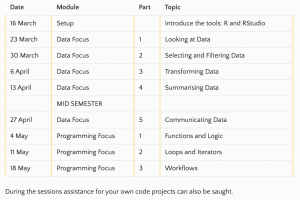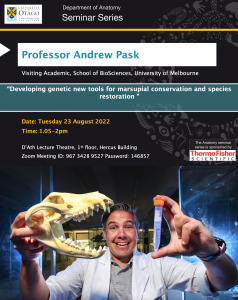Upcoming events hosted by or involving Genetics Otago will be listed here. Please check back regularly for updates. A calendar of events that may be of interest to our members can be found at the bottom of this page and in the sidebar of other pages on this site, please note that this includes events hosted outside of Genetics Otago.
Calendar of Events
The below is a calendar of events hosted by GO as well as events hosted by others that may be of interest to our members. If you have an event you would like us to include please contact us here.
R for Successful Student Projects is back again this semester starting 16th March. Across 9 sessions online, Wednesdays 10am-12pm, Murray Cadzow and Patricia Haden from the RTIS programming team will be teaching R, starting with an introduction to R syntax, through to using R with a focus on data, then onto how to use R programmatically. During each session, there will also be time to seek help and advice on how to use R for your own projects.
Staff are welcome to join in.
Please register your interest at https://rtis-training.github.io/r4ssp.
R for Successful Student Projects is back again this semester starting 16th March. Across 9 sessions online, Wednesdays 10am-12pm, Murray Cadzow and Patricia Haden from the RTIS programming team will be teaching R, starting with an introduction to R syntax, through to using R with a focus on data, then onto how to use R programmatically. During each session, there will also be time to seek help and advice on how to use R for your own projects.
Staff are welcome to join in.
Please register your interest at https://rtis-training.github.io/r4ssp.
R for Successful Student Projects is back again this semester starting 16th March. Across 9 sessions online, Wednesdays 10am-12pm, Murray Cadzow and Patricia Haden from the RTIS programming team will be teaching R, starting with an introduction to R syntax, through to using R with a focus on data, then onto how to use R programmatically. During each session, there will also be time to seek help and advice on how to use R for your own projects.
Staff are welcome to join in.
Please register your interest at https://rtis-training.github.io/r4ssp.
HRI is hosting an online student open day on Tuesday, 17th May 2022 from 12:00pm to 1:15pm (AEST).
This will give potential students and future RA’s the chance to learn more about what we do at HRI and get a feel for whether they would like to pursue study under our world-class researchers.
I would particularly encourage any students who are nearing completing of undergraduate degrees and interested in pursuing honours to attend, as our scientists are always interested in supervising up and coming researchers. I would also encourage those who have completed their honours or masters, as we have the RA Pathways to PhD program which may be of interest to them.
Interested parties can find out more information and register for the open day here: HRI Open Day • Heart Research Institute
R for Successful Student Projects is back again this semester starting 16th March. Across 9 sessions online, Wednesdays 10am-12pm, Murray Cadzow and Patricia Haden from the RTIS programming team will be teaching R, starting with an introduction to R syntax, through to using R with a focus on data, then onto how to use R programmatically. During each session, there will also be time to seek help and advice on how to use R for your own projects.
Staff are welcome to join in.
Please register your interest at https://rtis-training.github.io/r4ssp.
R for Successful Student Projects is back again this semester starting 16th March. Across 9 sessions online, Wednesdays 10am-12pm, Murray Cadzow and Patricia Haden from the RTIS programming team will be teaching R, starting with an introduction to R syntax, through to using R with a focus on data, then onto how to use R programmatically. During each session, there will also be time to seek help and advice on how to use R for your own projects.
Staff are welcome to join in.
Please register your interest at https://rtis-training.github.io/r4ssp.
R for Successful Student Projects is back again this semester starting 16th March. Across 9 sessions online, Wednesdays 10am-12pm, Murray Cadzow and Patricia Haden from the RTIS programming team will be teaching R, starting with an introduction to R syntax, through to using R with a focus on data, then onto how to use R programmatically. During each session, there will also be time to seek help and advice on how to use R for your own projects.
Staff are welcome to join in.
Please register your interest at https://rtis-training.github.io/r4ssp.
Professor Andrew Pask (School of BioSciences, University of Melbourne) is visiting Dunedin next week and will be giving a special seminar on Tuesday 23rd August at 1 pm in the D’Ath Lecture Theatre.
Prof. Pask has worked on marsupial development and genetics for over 20 years. He heads up the Thylacine integrated genomic restoration research lab (TIGRR) and the evo-devo-repro lab in the School of BioSciences. His research is exploring novel ways to conserve marsupials and de-extinct the thylacine.



